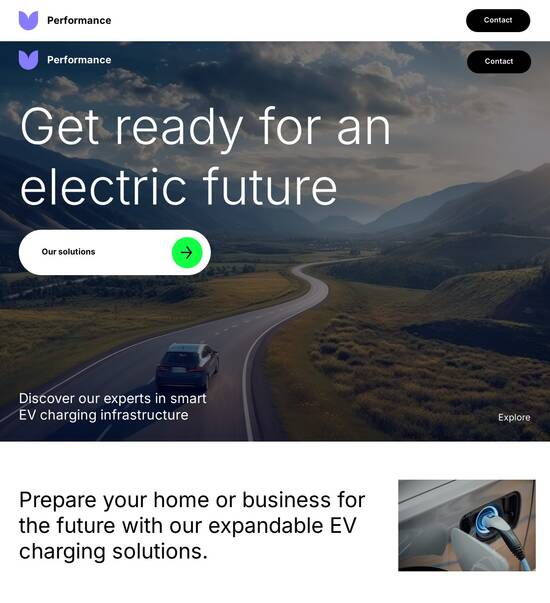
Pros and cons page template optimized for MacBook
Explore Similar TemplatesAbout template
Design using a responsive pros and cons page template that delivers a flawless experience on MacBook. Try Instapage today!
Recommended templates

Easy to build without coding
With the intuitive drag-and-drop builder, anyone on your team can create high-converting pages without any knowledge of code or design. Make enhancements to your landing page with custom widgets using Javascript, HTML/CSS, or third-party scripts.

Multiple layouts for any industry and goal
Select from 500+ landing page layouts built to boost conversions across industry-specific scenarios. Customize them by adjusting fonts, adding images, and generating on-brand content with the AI assistant. Quickly scale with Instablocks® and Global Blocks that you can save, reuse, and update globally.

Loads fast and looks polished on any device
Every template is responsive, which means they present professionally on any device and load blazingly fast with our Thor Render Engine. You can also power them up with Google AMP technology to deliver an unparalleled mobile experience and drive higher conversions.

Robust analytics & experimentation
Get real-time updates and reporting across all your devices, showing the number of visitors, conversions, cost-per-visitor, and cost-per-lead. Launch AI-powered experiments, run A/B tests, and use heatmaps to analyze user behavior, then optimize your landing page to maximize conversions.







Easy to build without coding
With the intuitive drag-and-drop builder, anyone on your team can create high-converting pages without any knowledge of code or design. Make enhancements to your landing page with custom widgets using Javascript, HTML/CSS, or third-party scripts.
Multiple layouts for any industry and goal
Select from 500+ landing page layouts built to boost conversions across industry-specific scenarios. Customize them by adjusting fonts, adding images, and generating on-brand content with the AI assistant. Quickly scale with Instablocks® and Global Blocks that you can save, reuse, and update globally.
Loads fast and looks polished on any device
Every template is responsive, which means they present professionally on any device and load blazingly fast with our Thor Render Engine.
Robust analytics & experimentation
Get real-time updates and reporting across all your devices, showing the number of visitors, conversions, cost-per-visitor, and cost-per-lead. Launch AI-powered experiments, run A/B tests, and use heatmaps to analyze user behavior, then optimize your landing page to maximize conversions.
All the features you need to build lead-generating landing pages
Explore more featuresLearn how to build top-performing landing pages for any goal
FAQs
Leading the way in building high-performing landing pages





A comprehensive guide to using Instapage for conversion rate optimization
Mastering digital marketing campaigns starts with effective landing pages. Instapage, the leading landing page and CRO platform, provides marketers with the tools necessary to optimize and scale their campaigns, maximizing return on investment through smart design and data-driven strategies. This guide breaks down the essential steps to harnessing Instapage for conversion rate optimization.
Understanding the power of landing pages
Landing pages play a crucial role in the success of digital marketing. They serve as the first point of contact between your audience and your brand. Utilizing Instapage allows marketers in business services, tech/SaaS, and other verticals to create targeted experiences that resonate with different audience segments. With a library of over 100 customizable templates, Instapage simplifies the process of creating high-converting landing pages.
- Boost conversions: Optimize your landing page design and content to lead to higher conversion rates.
- Personalization: Tailor your landing page content to meet the unique needs of different audience groups.
- Analytics: Use Instapage's reporting tools to track performance and gain insights into user behavior.
Setting up your first landing page in Instapage
Getting started with Instapage is straightforward and intuitive. Simply log in to your account, choose a template that fits your campaign objectives, and begin customizing it to reflect your brand messaging and audience expectations. Focus on creating a clean layout that minimizes distractions and emphasizes your call-to-action.
Optimizing your landing page for higher conversions
Optimization is critical for ensuring that your landing pages perform effectively. A/B testing is one of the key features within Instapage to determine which elements resonate best with your audience. Use varied headlines, images, and CTAs to discover what works best.
- Implement A/B testing: Design multiple versions of your landing page to test different headlines, imagery, and calls to action.
- Utilize heatmaps: Analyze where users click and spend time on your page for better adjustments.
- Convert with simplicity: Ensure that forms are short and to the point, allowing for quick user interaction.
Collaborating for quick page turnarounds
Efficient feedback loops and collaboration capabilities are essential for faster turnaround times when creating landing pages. Instapage allows multiple users to edit in real-time, making it easy for teams to work together, give instant feedback, and implement changes swiftly.
- Real-time editing: Multiple users can access and modify pages simultaneously.
- Feedback features: Leave comments directly on the page for clear communication.
- Stakeholder sharing: Securely share landing pages with clients or external parties for approval before publishing.
By utilizing Instapage, you're not just creating landing pages; you are crafting experiences that drive conversions and satisfy diverse audience needs.
Ready to transform your digital marketing efforts? Explore Instapage today and take the first step towards maximizing your campaign performance.
People also ask about Pros and cons page template optimized for MacBook
Understanding the pros and cons of an optimized page template for MacBook
The evolution of page templates: A MacBook perspective
Historically, page templates have played a critical role in web design and marketing strategies. These templates provided a streamlined way for marketers to convey their messages effectively while minimizing development costs. The transition to MacBook optimization is evident as more users rely on Apple's devices for creative work and productivity. With higher resolutions and specific frameworks that MacBooks operate on, the necessity for tailored templates became clear.
Apple’s design principles further enhance template layouts by promoting clarity, ease of use, and visual appeal. The aesthetic prowess associated with MacBooks has led many developers to optimize templates exclusively for this platform, which reflects a broader business trend towards creating specialized tools that cater to distinct user bases.
Key features of optimized page templates
Optimized page templates come with several key features that enhance user experience. One of the most significant attributes is cross-platform compatibility. Ensuring templates function smoothly across devices is critical, especially for MacBook users who often switch between different modes. For instance, a marketing professional may begin designing on a MacBook but later access the same template on an iPad or an iPhone.
Seamless synchronization of work across devices avoids productivity disruptions.
Real-time collaboration capabilities allow teams to work together effectively regardless of location.
The user-friendly interface is another cornerstone of modern templates. The intuitive design elements make it simple for users to navigate and customize their pages, creating a smooth user journey. For example, an infographic depicting the user journey could effectively showcase how streamlined the process is for MacBook users.
Furthermore, customization options within these templates are vast, allowing users to choose from various design aesthetics tailored for their needs. From changing color schemes to altering layouts, there's a range of features users can adjust, represented symbolically as tick marks for customizable features.
Pros of using page templates on MacBook
One of the standout benefits of using page templates on MacBooks is enhanced productivity. Templates streamline the page creation process, enabling users to launch campaigns much faster than if they started from scratch. Time-saving capabilities such as pre-filled content blocks reduce the hours spent on design and enable users to focus on crafting compelling messages.
Quickly deploy landing pages with ready-to-use sequences.
Reduce design time directly impacting overall project timelines.
Additionally, an aesthetic appeal cannot be overstated. Well-designed templates draw users in, keeping them engaged longer. A comparison table showcasing aesthetically pleasing templates versus generic ones illustrates how design quality can potentially lead to improved engagement and conversion rates.
Built-in analytics features also provide immediate access to essential performance metrics, enabling marketers to always be aware of their campaigns' effectiveness. This integration proves beneficial especially for MacBook users who prioritize data-driven decisions in their marketing strategies.
Moreover, collaboration features allow teams to work on projects simultaneously. This functional advantage is particularly pronounced in team-based projects requiring real-time communication and editing capabilities. A diagram visually illustrating collaboration timelines can emphasize how these templates cater to project dynamics.
Cons of using page templates on MacBook
While page templates offer various advantages, they are not without drawbacks. One inherent limitation is flexibility. Many templates come with predefined structures, which can stifle creativity and limit users to specific layouts and designs that may not fully align with their brand identity. This situation can be metaphorically compared to a key that fits only one lock, highlighting the restriction users may feel.
Over-reliance on templates can also be detrimental. There's a risk that users may neglect to customize sufficiently, leading to bland and indistinguishable marketing collateral. As such, it’s crucial to uphold a healthy mix of originality and usability. Careful attention to dos and don'ts when using templates effectively ensures that the uniqueness of a brand shines through.
Finally, template clutter can present challenges. Many templates come laden with features and functionalities that may overwhelm users. Managing notifications and updates often leads to confusion rather than clarity. Users must navigate a fine line between exploiting helpful features and feeling inundated by excessive options.
Specifics of template optimization for MacBook
Optimizing page templates for MacBook users requires consideration of performance specifications essential for optimal functioning. Users must ensure their devices meet the necessary system requirements to fully leverage these templates. Infographics can highlight the ideal setup for MacBook usage, emphasizing the critical components that support strong performance.
Another factor is the update cycle for templates. Regular updates infuse new features and resolve bugs, affecting user experience positively or negatively. Visual representations—a cross mark symbolizing the divide between outdated and updated template features—can convey the importance of maintaining current versions.
Moreover, user feedback integration plays a significant role in evolving templates. Community input guides developers in making iterative improvements. Illustrating user satisfaction ratings with graphical representations can underscore the impact of this feedback loop on template diversity and quality.
Visualizing the page template impact
When discussing page template impact, presentation format is vital. Effective slide decks about templates should follow specific guidelines to communicate value effectively. Features such as clean layouts, impactful visuals, and cohesive messaging can drive home the benefits of optimized templates. Following structured steps to create a compelling presentation can facilitate the selling of the template's value to audiences.
Conceptual diagrams can also deepen understanding by simplifying complex ideas. A flowchart outlining the user experience journey, specifically highlighting MacBook advantages, helps visualize how templates streamline processes. This approach not only boosts comprehension but also reinforces the importance of user-centric design.
Target audience considerations
Understanding the diverse user segments is crucial when discussing optimized page templates. Different market needs influence the functionality and design aspects of templates. For instance, business services may prioritize analytics-driven templates, while educational institutions may seek those designed for interactive learning experiences.
Furthermore, it’s essential to articulate the value proposition specifically for MacBook users. The unique features and functionalities cater to their needs, ensuring efficiency and productivity, particularly in fast-paced environments. By presenting case studies that showcase varied experiences across industries, marketers can better understand how optimized templates can serve distinct objectives.
Future trends in template design for MacBook
Looking ahead, emerging technologies such as AI and machine learning are set to revolutionize page templates. These innovations promise hyper-personalization and dynamic features that continuously evolve to meet user demands, particularly for MacBook users who seek cutting-edge solutions. Predictions indicate a future where templates adapt more rapidly to user preferences and system capabilities.
Moreover, community-driven developments will continue to shape the landscape of template design. User forums and feedback loops play a pivotal role in helping developers understand the needs and expectations of end users. Engagement metrics can showcase participation levels in development feedback, highlighting the importance of community collaboration in driving innovation.
Final thoughts on maximizing template usability
To maximize the usability of page templates on MacBooks, following best practices for implementation is crucial. Steps such as adequately training users, ensuring proper device integration, and maintaining regular updates will foster success. It's necessary to create a proactive strategy that encourages experimentation while still adhering to brand standards.
Equally important is avoiding common pitfalls associated with template usage. A recap of prevalent mistakes can be instrumental for users navigating the complex landscape of templates. A summarized final checklist depicting dos and don’ts, supported by visual symbols, can serve as a handy reference for both novice and experienced users alike.
Ready to skyrocket conversions?
Supercharge your ad campaigns with high-performing landing pages
Get started














